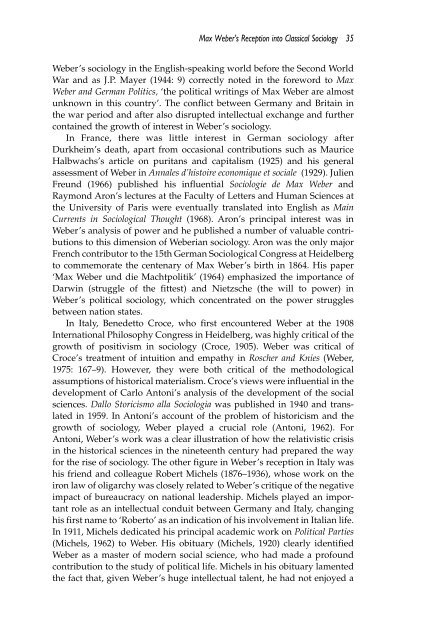You also want an ePaper? Increase the reach of your titles
YUMPU automatically turns print PDFs into web optimized ePapers that Google loves.
Max Weber’s Reception into <strong>Classical</strong> <strong>Sociology</strong> 35<br />
Weber’s sociology in the English-speaking world before the Second World<br />
War and as J.P. Mayer (1944: 9) correctly noted in the foreword to Max<br />
Weber and German Politics, ‘the political writings of Max Weber are almost<br />
unknown in this country’. The conflict between Germany and Britain in<br />
the war period and after also disrupted intellectual exchange and further<br />
contained the growth of interest in Weber’s sociology.<br />
In France, there was little interest in German sociology after<br />
Durkheim’s death, apart from occasional contributions such as Maurice<br />
Halbwachs’s article on puritans and capitalism (1925) and his general<br />
assessment of Weber in Annales d’histoire economique et sociale (1929). Julien<br />
Freund (1966) published his influential Sociologie de Max Weber and<br />
Raymond Aron’s lectures at the Faculty of Letters and Human Sciences at<br />
the University of Paris were eventually translated into English as Main<br />
Currents in Sociological Thought (1968). Aron’s principal interest was in<br />
Weber’s analysis of power and he published a number of valuable contributions<br />
to this dimension of Weberian sociology. Aron was the only major<br />
French contributor to the 15th German Sociological Congress at Heidelberg<br />
to commemorate the centenary of Max Weber’s birth in 1864. His paper<br />
‘Max Weber und die Machtpolitik’ (1964) emphasized the importance of<br />
Darwin (struggle of the fittest) and Nietzsche (the will to power) in<br />
Weber’s political sociology, which concentrated on the power struggles<br />
between nation states.<br />
In Italy, Benedetto Croce, who first encountered Weber at the 1908<br />
International Philosophy Congress in Heidelberg, was highly critical of the<br />
growth of positivism in sociology (Croce, 1905). Weber was critical of<br />
Croce’s treatment of intuition and empathy in Roscher and Knies (Weber,<br />
1975: 167–9). However, they were both critical of the methodological<br />
assumptions of historical materialism. Croce’s views were influential in the<br />
development of Carlo Antoni’s analysis of the development of the social<br />
sciences. Dallo Storicismo alla Sociologia was published in 1940 and translated<br />
in 1959. In Antoni’s account of the problem of historicism and the<br />
growth of sociology, Weber played a crucial role (Antoni, 1962). For<br />
Antoni, Weber’s work was a clear illustration of how the relativistic crisis<br />
in the historical sciences in the nineteenth century had prepared the way<br />
for the rise of sociology. The other figure in Weber’s reception in Italy was<br />
his friend and colleague Robert Michels (1876–1936), whose work on the<br />
iron law of oligarchy was closely related to Weber’s critique of the negative<br />
impact of bureaucracy on national leadership. Michels played an important<br />
role as an intellectual conduit between Germany and Italy, changing<br />
his first name to ‘Roberto’ as an indication of his involvement in Italian life.<br />
In 1911, Michels dedicated his principal academic work on Political Parties<br />
(Michels, 1962) to Weber. His obituary (Michels, 1920) clearly identified<br />
Weber as a master of modern social science, who had made a profound<br />
contribution to the study of political life. Michels in his obituary lamented<br />
the fact that, given Weber’s huge intellectual talent, he had not enjoyed a

















